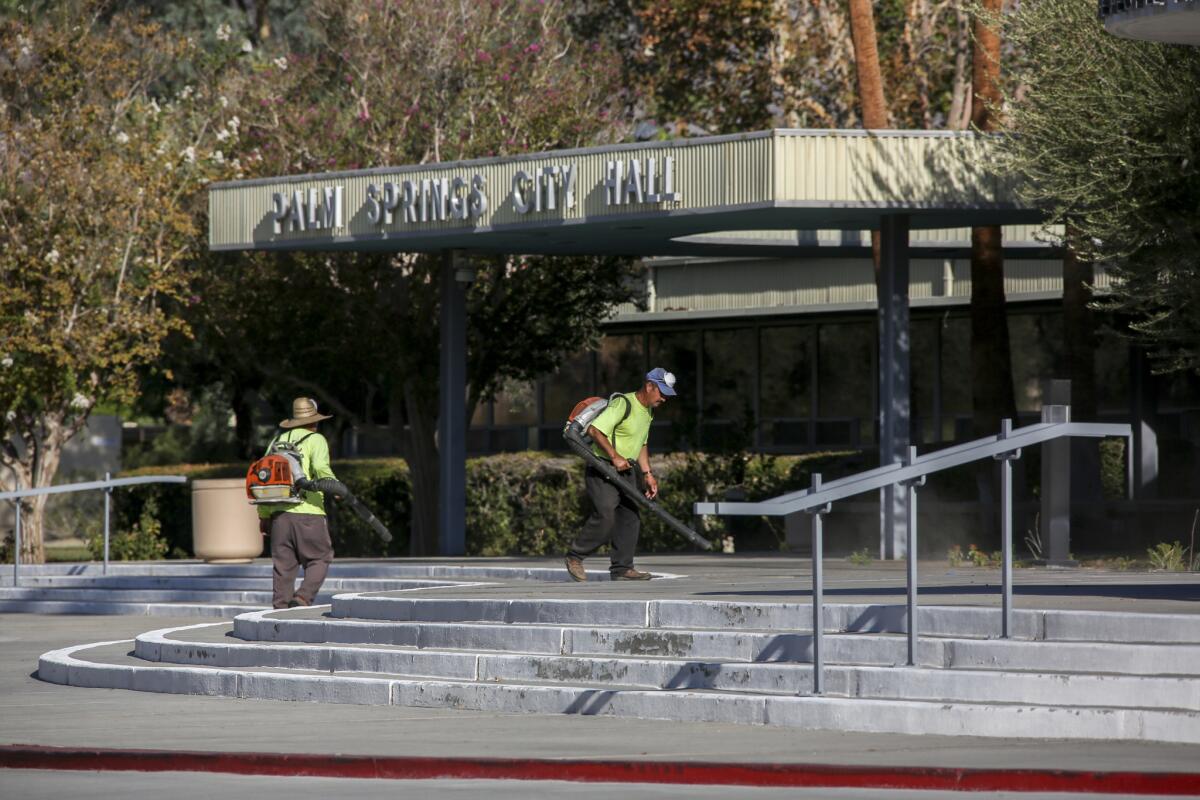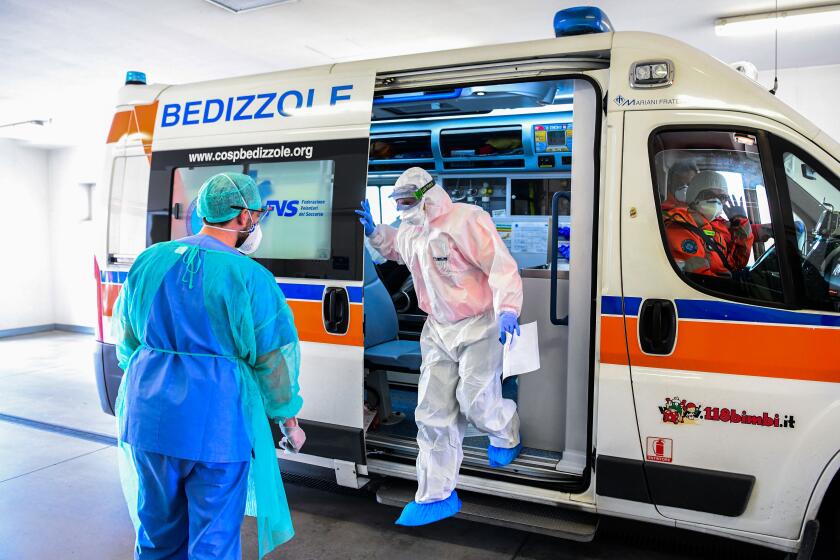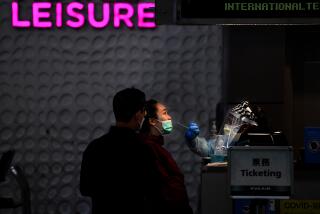With three coronavirus deaths in area, Palm Springs issues shelter-in-place order

- Share via
Faced with three COVID-19 deaths in the Coachella Valley, Palm Springs has issued a shelter-in-place order in an effort to slow the coronavirus’ spread.
The city in a news release said its order is modeled on the one in effect in San Francisco.
As of Wednesday, Riverside County had reported three coronavirus fatalities and 16 cases of infection. The three deaths — two men and one woman from the Coachella Valley — were all older than 70. Two had underlying health problems, including the woman, who had spent time at a Rancho Mirage skilled nursing facility before she was hospitalized.
Dr. Michael Mesisca, medical director of the Riverside University Health System Medical Center, said all residents and employees of the Rancho Mirage Health and Rehabilitation Center, roughly 200 people, had been tested. Results are expected this week, but sor far no one from the facility has been hospitalized with virus symptoms.
County health officials have advised all skilled nursing facilities to restrict access to residents and instructed the staff of the Rancho Mirage home not to work at any other facilities.
Caretakers are washing their hands between interactions with patients, who are being closely monitored for fever, Mesisca said.
The Coachella Valley has a large elderly population, which is at a higher risk of falling seriously ill from the virus. Many of Washington state’s coronavirus deaths have been tied to a nursing home.
“We’re very concerned about Coachella Valley and across our elderly population,” Mesisca said.
The daughter of the woman who died Monday told the Desert Sun that her mother was being treated for leukemia and had spent some time at the nursing home before she was hospitalized.
The latest updates from our reporters in California and around the world
Here is the Palm Springs order:
Ordered to shelter in place: The public should stay at home as much as possible, with certain exceptions — such as to go to the supermarket, pick up prescriptions or go to the doctor; exercise, such as walking, running or hiking; and to check on relatives. There are exceptions for certain essential government and business functions.
Exceptions to the stay-at-home order:
- To do things essential to health and safety of the household, including pets, such as getting medical supplies, visiting a clinic or hospital, or obtaining supplies to work from home.
- To obtain needed services or supplies, such as buying groceries.
- To engage in outdoor activities such as walking, hiking, running, and taking the dog for a walk, while keeping six feet away from others.
- To do work for essential businesses that are exempted from the order to shut down, as defined below.
- To care for a family member or pet in another household.
- To continue working for a healthcare operation, such as a hospital, clinic, dentist’s office, pharmacy, pharmaceutical and biotech company, a healthcare facility, healthcare supplier, home healthcare service, mental health provider, veterinary office or other related services.
- To continue working for construction projects needed for essential infrastructure, such as building housing, airport operations, and work on water, sewer, gas, electrical, oil refining, roads and highways, public transportation, solid waste collection, internet and telecom systems.
- To continue working as first responders, emergency management personnel, emergency dispatchers, court personnel, and law enforcement. Anyone needed to ensure the continuing operation of government agencies and provide for the health, safety and welfare of the public is exempt.
Gatherings: Gatherings are prohibited.
Ordered shut: All businesses, including bars, gyms and movie theaters, must cease operations.
Exceptions to the order to shut down: Essential businesses or firms that perform an essential government function may continue operating. They include:
- Healthcare operations, including home health workers;
- Essential infrastructure, including construction of housing and operation of public transportation and utilities;
- Grocery stores, farmers markets, food banks, convenience stores;
- Businesses that provide necessities of life for economically disadvantaged individuals and shelter facilities;
- Pharmacies, healthcare supply stores, and healthcare facilities;
- Gas stations and auto repair facilities;
- Banks;
- Garbage collection;
- Hardware stores, plumbers, electricians, and other service providers necessary to maintaining the safety, sanitation, and essential operation of residences and other essential businesses;
- Educational institutions, for the purposes of facilitating distance learning;
- Laundromats, dry cleaners, and laundry service providers;
- Businesses that ship or deliver groceries, food, and goods directly to residences;
- Childcare facilities providing services that enable essential employees to go to work;
- Roles required for any essential business to “maintain basic operations,” which include security, payroll, and similar activities.
Restaurants: May offer food only by delivery, pickup or drive-through.
Effective: March 18 to April 2.
More to Read
Sign up for Essential California
The most important California stories and recommendations in your inbox every morning.
You may occasionally receive promotional content from the Los Angeles Times.















